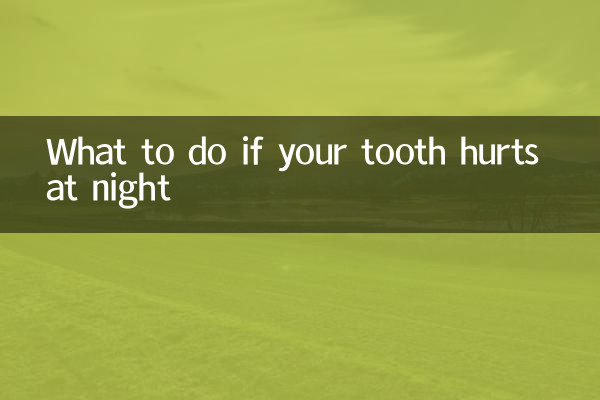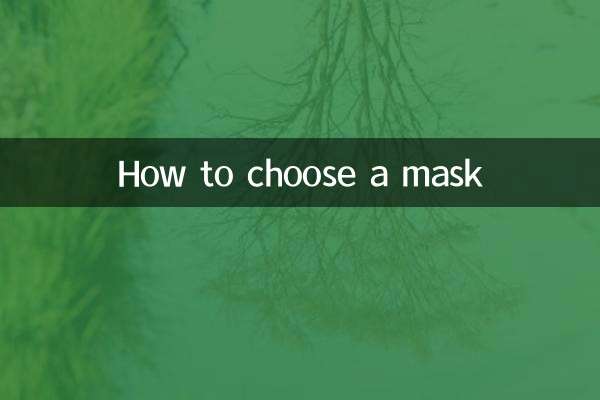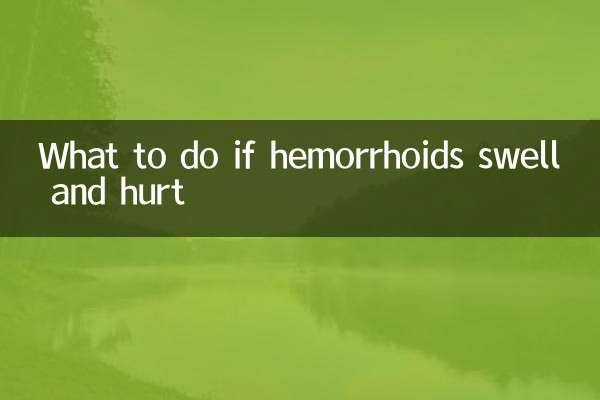What to do if your tooth hurts at night
In the past 10 days, health topics have continued to heat up across the Internet, especially oral health issues that have attracted much attention. Many netizens report that toothache occurs frequently at night, seriously affecting their sleep and quality of life. This article will focus on this hot topic, provide structured data and practical suggestions to help everyone deal with toothache at night.
1. Common causes of toothache at night

According to search data and medical forum discussions in the past 10 days across the Internet, the main causes of toothache at night are as follows:
| reason | Proportion | Typical symptoms |
|---|---|---|
| Dental caries (tooth decay) | 35% | Pain that worsens at night and is sensitive to heat and cold |
| Pulpitis | 25% | Persistent throbbing pain that may radiate to the head |
| Gingivitis | 20% | Red, swollen and bleeding gums, accompanied by dull pain |
| Inflammation of wisdom teeth | 15% | Pain in the back teeth and difficulty opening the mouth |
| other reasons | 5% | Including tooth cracks, periodontal abscess, etc. |
2. Scientific explanation of toothache worsening at night
Medical experts across the Internet generally believe that the main reasons why toothache worsens at night are as follows:
1.Postural changes: When lying down, the blood flow to the head increases and the pressure in the pulp cavity increases, resulting in increased pain.
2.focus: When the environment is quiet at night, people’s perception of pain will be more obvious.
3.changes in hormone levels: Cortisol levels are reduced at night and anti-inflammatory effects are weakened.
4.Teeth grinding habit: Some people grind their teeth unconsciously during sleep, which can aggravate tooth damage.
3. Emergency treatment plan
Based on the most popular first aid methods on the Internet in the past 10 days, the following practical suggestions are compiled:
| method | Operating Instructions | Things to note |
|---|---|---|
| Cold compress method | Wrap an ice pack in a towel and apply it to the affected cheek | No more than 15 minutes at a time to avoid frostbite |
| Rinse with salt water | Gargle with warm salt water for 30 seconds | The concentration is about 3%, no more than 5 times a day |
| Medications for pain relief | Take pain relievers such as ibuprofen | Strictly follow the dosage instructions |
| Raise your head | Use a tall pillow to maintain a 45-degree angle | Reduce dental pulp pressure |
| Clove oil for pain relief | Dip a small amount into the cotton swab and apply it to the affected area | Pregnant women should use with caution |
4. Preventive measures
Based on discussions on oral health topics across the Internet, it is recommended to take the following preventive measures:
1.Regular dental check-ups: Professional teeth cleaning and check-up at least 1-2 times a year.
2.The correct way to brush your teeth: Use Pasteur brushing method, no less than 2 minutes each time.
3.control diet: Reduce the intake of high-sugar foods and avoid excessive cold or heat stimulation.
4.floss: Clean between teeth at least once a day.
5.night protection: Patients who grind their teeth can use professional dental pads.
5. When is it necessary to seek medical treatment?
According to the medical Q&A data on the entire network, you should seek medical treatment immediately if the following situations occur:
1. Pain that persists for more than 24 hours without relief
2. Accompanied by facial swelling or heat
3. Obvious pus or peculiar smell appears
4. Affect normal eating and sleeping
5. Patients with underlying diseases such as heart disease
6. Clarification of common misunderstandings
In the past 10 days of online discussions, the following misunderstandings have been discovered that need to be corrected:
| Misunderstanding | fact |
|---|---|
| Toothache can heal on its own | Diseases such as pulpitis must be treated professionally |
| Bite aspirin to relieve pain | Can burn oral mucosa |
| Toothache requires tooth extraction | Treatment can be retained in most cases |
| Antibiotics can cure toothache | The type of infection needs to be clarified to be effective |
7. Summary
Although toothache at night is common, it should not be taken lightly. Through the analysis of the entire network data, it can be seen that timely and correct measures and prevention are the key. I hope the structured data and practical advice in this article will help you better deal with nighttime toothache. Remember, if you have long-term toothache, you must seek professional dental help to avoid delaying treatment.

check the details

check the details